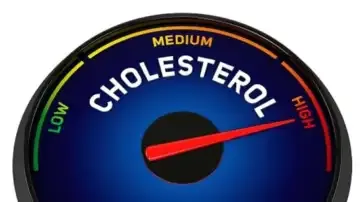Cardiologist says cut this from your diet today to protect your heart from high cholesterol
admin | July 21, 2025 10:22 PM CST

Health experts warn a common cholesterol problem, dyslipidemia, is killing millions of people every year. Dyslipidemia is a condition characterised by abnormal deviations in lipid levels in the blood, including elevated low-density lipoprotein (LDL), reduced high-density lipoprotein (HDL), or increased triglycerides.
This condition can cause cardiovascular issues and increase risk of developing atherosclerosis, heart attack and stroke.
Your chest pain might not be stress, doctors say it could be this lipid disorder
According to experts, dyslipidemia exhibits very common symptoms and thus detection rates are very low. The body does not react to cholesterol build-up in the arteries until there is a blockage, which can lead to heart attacks (reduced blood flow to the heart) and stroke (oxygen being cut-off to the brain).
If not treated on time, it can lead to disability and even death. In fact, as per a WHO estimate, raised cholesterol levels are behind 2.6 million deaths and 29.7 million disability-adjusted life years globally each year.
 The lack of symptoms in conditions like dyslipidemia leads to delayed diagnosis and treatment, missing the critical window for preventive intervention and lifestyle correction. Most patients do not seek medical help until it is too late, mainly because the symptoms which have been enlisted below are too common place and ranges from:
The lack of symptoms in conditions like dyslipidemia leads to delayed diagnosis and treatment, missing the critical window for preventive intervention and lifestyle correction. Most patients do not seek medical help until it is too late, mainly because the symptoms which have been enlisted below are too common place and ranges from:
 He cautioned, "Comorbidities such as diabetes, hypertension, hypothyroidism, chronic kidney disease, or liver disease can affect lipid levels or increase the risk of cardiovascular disease; therefore, it is important to remain compliant with all medications and be consistent with follow-ups with your healthcare provider. A proactive approach is essential for preventing complications and protecting long-term heart health."
He cautioned, "Comorbidities such as diabetes, hypertension, hypothyroidism, chronic kidney disease, or liver disease can affect lipid levels or increase the risk of cardiovascular disease; therefore, it is important to remain compliant with all medications and be consistent with follow-ups with your healthcare provider. A proactive approach is essential for preventing complications and protecting long-term heart health."
 The lack of symptoms in conditions like dyslipidemia leads to delayed diagnosis and treatment, missing the critical window for preventive intervention and lifestyle correction. Most patients do not seek medical help until it is too late, mainly because the symptoms which have been enlisted below are too common place and ranges from:
The lack of symptoms in conditions like dyslipidemia leads to delayed diagnosis and treatment, missing the critical window for preventive intervention and lifestyle correction. Most patients do not seek medical help until it is too late, mainly because the symptoms which have been enlisted below are too common place and ranges from:
- Chest pain or discomfort
- Shortness of breath
- Fatigue
- Feeling out of breath during physical activity
- High blood pressure
- Heart Palpitations
- LDL cholesterol: less than 100 mg/dL
- HDL cholesterol: more than 40 mg/dL for men and more than 50 mg/dL for women
- Triglycerides: less than 150 mg/dL
- Total cholesterol: less than 200 mg/dL
 He cautioned, "Comorbidities such as diabetes, hypertension, hypothyroidism, chronic kidney disease, or liver disease can affect lipid levels or increase the risk of cardiovascular disease; therefore, it is important to remain compliant with all medications and be consistent with follow-ups with your healthcare provider. A proactive approach is essential for preventing complications and protecting long-term heart health."
He cautioned, "Comorbidities such as diabetes, hypertension, hypothyroidism, chronic kidney disease, or liver disease can affect lipid levels or increase the risk of cardiovascular disease; therefore, it is important to remain compliant with all medications and be consistent with follow-ups with your healthcare provider. A proactive approach is essential for preventing complications and protecting long-term heart health."
READ NEXT




